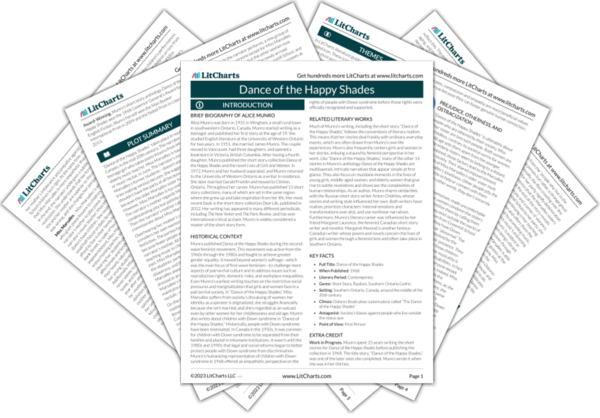“Dance of the Happy Shades” is ultimately about people who are othered by their society. Miss Marsalles and her sister are two such people. Both women are unmarried and childless, contrary to societal norms for women. Moreover, their old age sets them apart from the younger, modern women; the elderly sisters seem to belong to a distant, antiquated past. Combined, these factors lead to the Marsalles sisters’ isolation from society. Their shared impoverishment and the declining health of Miss Marsalles’s older sister must also intensify Miss Marsalles’s loneliness. Other people pity the Marsalles sisters but do little to help or connect with them beyond a superficial level. In other words, they don’t sincerely care about the sisters.
Instead, they try to distance themselves, made uncomfortable by the sisters’ differences. Other women condemn the sisters for being ugly and grotesque, infantilize them by calling them babies, and they treat them as if they exist outside the world of “normal” people. Similarly, the children from Greenhill School are also othered by society. Because they have Down syndrome, they’re ostracized and seen as “abnormal.” The mothers at Miss Marsalles’s party are repulsed by the children’s differences and offended by their presence. They believe it’s polite to ignore the existence of these children rather than acknowledge them, and they think musicality is “useless” and “out-of-place” for children with disabilities. In fact, the children are effectively dehumanized by everyone except Miss Marsalles, who is herself othered by society. Indeed, Miss Marsalles is the only person in the story who treats the children with Down syndrome with any sort of kindness, as she seems to hold no prejudices against them. Furthermore, she treats everyone at her party equally and expresses the same amount of joy about all of her pupils’ performances. She’s neither shocked nor upset that Dolores Boyle, a girl with Down syndrome, plays the piano beautifully. Instead, she’s as happy with Dolores as with any of her students. By highlighting this dynamic, “Dance of the Happy Shades” illustrates the hurtful isolation and ostracization that some people in society undergo and, most importantly, refutes the notion that anyone should be shunned or kept invisible, instead encouraging a spirit of empathy and acceptance.
Prejudice, Otherness, and Ostracization ThemeTracker

Prejudice, Otherness, and Ostracization Quotes in Dance of the Happy Shades
[…] she turns her face from the telephone with that look of irritation—as if she had seen something messy which she was unable to clean up—which is her private expression of pity.
It is one of Miss Marsalles’ indestructible beliefs that she can see into children’s hearts, and she finds there a treasury of good intentions and a natural love of all good things. The deceits which her spinster’s sentimentality has practiced on her original good judgement are legendary and colossal; she has this way of speaking of children’s hearts as if they were something holy; it is hard for a parent to know what to say.
It must finally have come to seem like a piece of luck to them to be so ugly, a protection against life to be marked in so many ways, impossible, for they were gay as invulnerable and childish people are; they appeared sexless, wild and gentle creatures, bizarre yet domestic, living in their house in Rosedale outside the complications of time.
“Oh well I feel kind of sorry for a couple of old ladies like them. They’re a couple of babies, the pair.”
“Sometimes that kind is quite musical,” says Mrs. Clegg.
“Who are they?” my mother whispers, surely not aware of how upset she sounds.
“They’re from that class she has out at the Greenhill School. They’re nice little things and some of them are quite musical but of course they’re not all there.”
My mother and the others are almost audible saying to themselves: No, I know it is not right to be repelled by such children and I am not repelled, but nobody told me I was going to come here to listen to a procession of little—little idiots for that’s what they are—WHAT KIND OF A PARTY IS THIS?
The mothers sit, caught with a look of protest on their faces, a more profound anxiety than before, as if reminded of something that they had forgotten they had forgotten; the white-haired girl sits ungracefully at the piano with her head hanging down, and the music is carried through the open door and the windows to the cindery summer street.
To Miss Marsalles such a thing is acceptable, but to other people, people who live in the world, it is not.
[…] why is it that we are unable to say—as we must have expected to say—Poor Miss Marsalles? It is the Dance of the Happy Shades that prevents us, it is that one communiqué from the other country where she lives.











